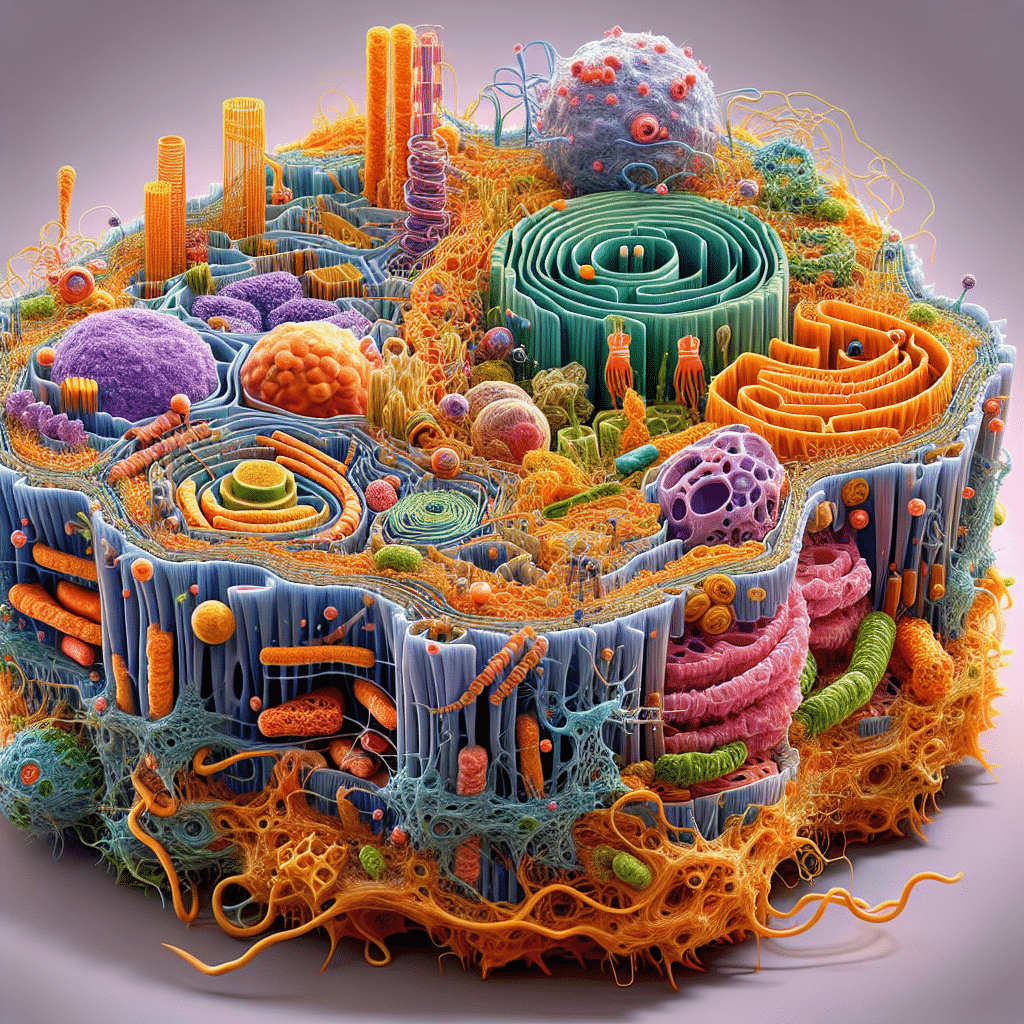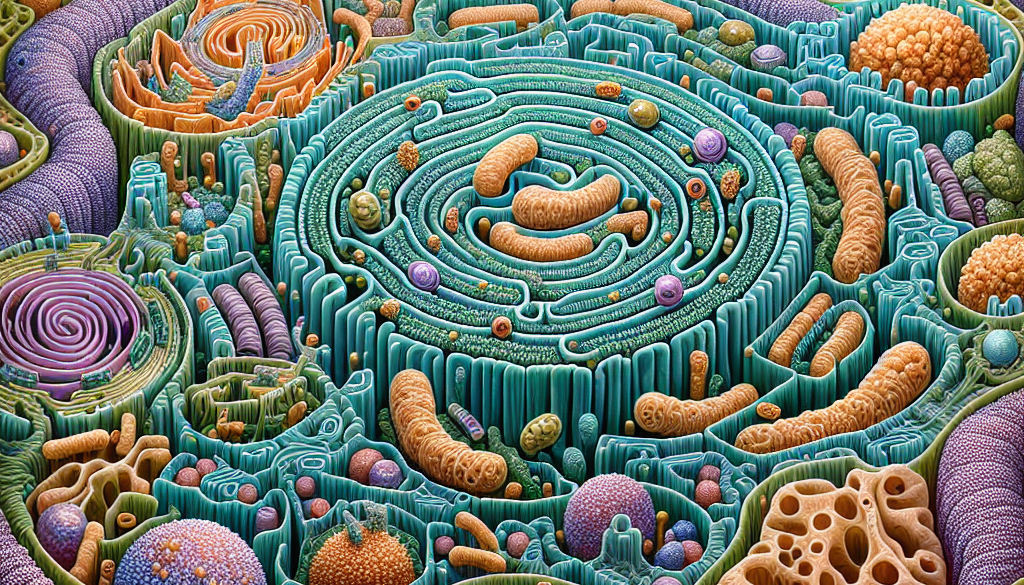Cellular Passageways: Carrying Proteins and More
-
Table of Contents
- Cellular Passageways: Essential Routes for Protein Transport and More
- The Intracellular Highway System
- Endoplasmic Reticulum: The Protein Production Line
- Golgi Apparatus: The Shipping and Receiving Center
- Vesicles: Cellular Delivery Vehicles
- Cytoskeleton: The Cellular Roadways
- Protein Transport: A Journey with Many Steps
- Case Studies and Examples
- Implications and Future Directions
- Conclusion: The Vital Role of Cellular Passageways
- Discover ETprotein’s High-Quality Protein Products
Cellular Passageways: Essential Routes for Protein Transport and More

Within the bustling metropolis of a cell, a complex network of passageways ensures the smooth transit of proteins and other vital molecules. These cellular highways are critical for maintaining the life-sustaining processes that occur in every living organism. In this article, we will delve into the intricate world of cellular passageways, exploring their roles, mechanisms, and importance in the transport of proteins and other substances.
The Intracellular Highway System
Cells are the fundamental units of life, and within each cell, there is a need for a highly organized transport system to distribute proteins and molecules where they are needed. This system is composed of various structures and mechanisms that work together to ensure efficient delivery.
Endoplasmic Reticulum: The Protein Production Line
The endoplasmic reticulum (ER) is a network of membranous tubules and sacs that plays a central role in the synthesis and folding of proteins. The rough ER, studded with ribosomes, is the site where proteins destined for secretion or for use in the cell membrane are synthesized. Once synthesized, these proteins are folded and modified in the ER lumen.
Golgi Apparatus: The Shipping and Receiving Center
After proteins are synthesized in the ER, they are transported to the Golgi apparatus. This organelle functions as the cell’s central hub for sorting and shipping proteins to their final destinations. The Golgi apparatus modifies, packages, and labels proteins with molecular “address tags” that determine their routing.
Vesicles: Cellular Delivery Vehicles
Vesicles are small, membrane-bound sacs that transport proteins from the ER to the Golgi apparatus and from the Golgi to various locations within the cell or to the cell surface for secretion. These vesicles can bud off from membranes and fuse with other membranes, facilitating the transfer of their protein cargo.
Cytoskeleton: The Cellular Roadways
The cytoskeleton is a dynamic network of protein filaments that provides structural support and also serves as tracks for the movement of vesicles and organelles within the cell. Motor proteins, such as kinesins and dyneins, walk along these filaments, dragging vesicles with them.
Protein Transport: A Journey with Many Steps
Proteins are the workhorses of the cell, performing a vast array of functions. Their journey from synthesis to their functional location is a multi-step process involving several cellular structures.
- Synthesis: Proteins are synthesized by ribosomes, either free in the cytoplasm or bound to the rough ER.
- Folding and Modification: Proteins undergo folding, and sometimes chemical modifications, to achieve their functional three-dimensional structures.
- Tagging: Proteins receive molecular tags that direct them to their proper destinations.
- Transport: Proteins are shuttled by vesicles through the cytoplasm to the Golgi apparatus for further processing.
- Sorting: The Golgi apparatus sorts proteins and lipids and sends them to their final destinations.
- Delivery: Proteins reach their target locations, where they perform their designated functions.
Case Studies and Examples
Understanding protein transport is not just an academic exercise; it has real-world implications for health and disease. For instance, cystic fibrosis is caused by a defect in the CFTR protein, which fails to reach the cell surface due to improper folding and trafficking. Similarly, Alzheimer’s disease involves issues with protein transport and aggregation in neurons.
On the other hand, the successful delivery of insulin in diabetes treatment relies on the proper functioning of cellular passageways. Insulin is produced in the pancreas and must be correctly processed and secreted to regulate blood sugar levels.
Implications and Future Directions
The study of cellular passageways and protein transport is a rapidly evolving field with significant implications for biotechnology and medicine. Advances in understanding these processes can lead to improved drug delivery systems, gene therapy techniques, and treatments for diseases caused by trafficking defects.
Conclusion: The Vital Role of Cellular Passageways
In conclusion, cellular passageways are essential for the proper functioning of cells and, by extension, the health of the entire organism. They ensure that proteins and other molecules are efficiently synthesized, modified, and delivered to their correct locations. Disruptions in this system can lead to disease, highlighting the importance of continued research in this area.
Discover ETprotein’s High-Quality Protein Products
If you’re looking for premium protein products, ETprotein offers a range of plant-based proteins that are perfect for various applications. Their products are organic, non-GMO, and allergen-free, making them suitable for a wide array of industries, including nutraceuticals, pharmaceuticals, and food and beverage.
ETprotein’s commitment to quality and customer satisfaction makes them a top choice for anyone in need of reliable protein sources. Whether you’re developing health supplements, sports nutrition products, or vegan-friendly foods, ETprotein has the expertise and inventory to meet your needs.
About ETprotein:
ETprotein, a reputable plant protein vegan protein Chinese factory manufacturer and supplier, is renowned for producing, stocking, exporting, and delivering the highest quality organic bulk vegan protein and plant proteins. They include Organic rice protein, clear rice protein, pea protein, clear pea protein, watermelon seed protein, pumpkin seed protein, sunflower seed protein, mung bean protein, peanut protein etc. Their offerings, characterized by a neutral taste, non-GMO, allergen-free attributes, cater to a diverse range of industries. They serve nutraceutical, pharmaceutical, cosmeceutical, veterinary, as well as food and beverage finished product distributors, traders, and manufacturers across Europe, USA, Canada, Australia, Thailand, Japan, Korea, Brazil, and Chile, among others.
ETprotein specialization includes exporting and delivering tailor-made protein powder and finished nutritional supplements. Their extensive product range covers sectors like Food and Beverage, Sports Nutrition, Weight Management, Dietary Supplements, Health and Wellness Products, and Infant Formula, ensuring comprehensive solutions to meet all your protein needs.
As a trusted company by leading global food and beverage brands and Fortune 500 companies, ETprotein reinforces China’s reputation in the global arena. For more information or to sample their products, please contact them and email sales(at)ETprotein.com today.












